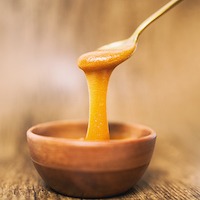Have a SWEET New Year
January 17th, 2022Honey tastes good, that’s for sure. But did you know that this natural sweetener could have benefits to our oral health? The thick, golden liquid, specifically a darker variety called manuka from Australia and New Zealand, may have higher antibacterial properties that can help relieve oral health issues.

Honey Through History
This is not the first time that honey, specifically manuka honey, has been reported to show broad-spectrum antibacterial activity. Since ancient times, honey has been attributed with curative properties. In addition to perhaps being nature’s first source of sweetener, honey was used by ancient Egyptians to produce healing salves and, overall, seemed to have served as an integral part of everyday life. Stone age paintings reportedly show the use of honey in diets and medicine.

1/PREVENT the development of resistant strains of bacteria.
2/ REDUCE acid production (manuka honey in particular) which therefore may help reduce gingivitis (gum disease).
3/CONTROL odor and inflammation in wounds secondary to squamous cell carcinoma in the oral cavity.
4/TREAT dry mouth in people undergoing treatment for head or neck cancer.
Similar studies have reported that:
- Honey could be used to help prevent cavities and gingivitis following orthodontic treatment.
- Honey may be helpful in preventing radiation-induced mucositis, an adverse inflammatory reaction.
- Propolis (a sticky substance also called “bee glue”) offers antiviral and fungicidal properties useful in treatment of gum disease.
- Chewing or sucking on manula honey could potentially reduce plaque and gingival bleeding.
We’re certainly not suggesting you cancel your next periodontal maintenance visit and slather on some honey instead. But it’s interesting to see how this common table food may have a place in modern medicine.
We’re always open to new ideas that promote oral health and look forward to seeing more research on this particular topic in the future. And don’t forget that, if you need treatment for gum disease, our doctors and periodontal hygienists offer today’s latest protocols to ensure you receive the area’s best periodontal care. Call us today at either 267-677-8686 (NE Philadelphia) or 215-643-4393 (Ambler) for more information. No referral is necessary!
